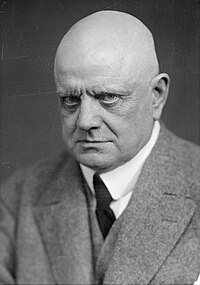Väinämöinen's Song
| Väinämöinen's Song | |
|---|---|
| Cantata by Jean Sibelius | |
 The composer (c. 1927) | |
| Native name | Väinön virsi |
| Opus | 110 |
| Text | Kalevala (Runo XLIII)[1] |
| Language | Finnish |
| Composed | 1926 |
| Duration | 11 mins.[2] |
| Premiere | |
| Date | 28 June 1926[2] |
| Location | Sortavala, Finland |
| Conductor | Robert Kajanus |
Väinämöinen's Song (in Finnish: Väinön virsi; sometimes translated to English simply as Väinö's Song), Op. 110, is a single-movement, patriotic cantata for mixed choir and orchestra written in 1926 by the Finnish composer Jean Sibelius. The piece, which is a setting of Runo XLIII (lines 385–434) of the Kalevala, Finland's national epic, is chronologically the final of Sibelius's nine orchestral cantatas; in particular, it belongs to the series of four "little known, but beautiful"[3] cantatas from the composer's mature period that also includes My Own Land (Op. 92, 1918), Song of the Earth (Op. 93, 1919), and Hymn of the Earth (Op. 95, 1920). Väinämöinen's Song premiered on 28 June 1926 in Sortavala, Finland.
Instrumentation
[edit]Väinämöinen's Song is scored for the following instruments and voices,[2] organized by family (vocalists, woodwinds, brass, percussion, and strings):
- Mixed choir (SATB)
- 2 flutes, 2 oboes, 2 clarinets (in B♭), and 2 bassoons
- 4 horns (in F), 3 trumpets (in B♭), and 3 trombones
- Timpani, bass drum, triangle, and glockenspiel
- Violins (I and II), violas, cellos, and double basses
The cantata premiered on 26 June 1926 at a singing festival in Sortavala (then still part of Finland), with the Finnish conductor Robert Kajanus conducting.[4]
History
[edit]Text
[edit]| Original Finnish | English translation[a] |
|---|---|
"Ole puolla poikiesi, |
'O protect thy sons for ever, |
Discography
[edit]The Estonian conductor Eri Klas and the Finnish National Opera Orchestra and Chorus made the world premiere studio recording of the Väinämöinen's Song in 1990 for Ondine.[2] The table below lists this and other commercially available recordings:
| No. | Conductor | Orchestra | Chorus | Rec.[b] | Time[c] | Venue | Label | Ref. |
|---|---|---|---|---|---|---|---|---|
| 1 | Eri Klas | Finnish National Opera Orchestra | Finnish National Opera Chorus | 1990 | 9:40 | Roihuvuori Church | Ondine | |
| 2 | Paavo Järvi | Estonian National Symphony Orchestra | Estonian National Male Choir Ellerhein Girls' Choir |
2002 | 8:42 | Estonia Concert Hall | Virgin Classics | |
| 3 | Osmo Vänskä | Lahti Symphony Orchestra | Dominante Choir | 2004 | 8:53 | Sibelius Hall | BIS |
Notes, references, and sources
[edit]Notes
[edit]- ^ This translation, by W. F. Kirby, is from the liner notes to the recording by Osmo Vänskä, the Lahti Symphony Orchestra, and the Dominante Choir.[5]
- ^ Refers to the year in which the performers recorded the work; this may not be the same as the year in which the recording was first released to the general public.
- ^ All runtimes are official, as printed on CD or LP liner notes.
- ^ E. Klas—Ondine (ODE 754-2) 1990
- ^ P. Järvi—Virgin Classics (7243 5 45589 2 4) 2003
- ^ O. Vänskä—BIS (CD–1565) 2006
References
[edit]- ^ Dahlström 2003, p. 406.
- ^ a b c d Dahlström 2003, p. 468.
- ^ Lascar 2003, p. 11.
- ^ Barnett 2007, p. 7.
- ^ Barnett 2005, pp. 33–34.
Sources
[edit]- Barnett, Andrew (2005). Sibelius: Song of the Earth (booklet). Osmo Vänskä, Lahti Symphony Orchestra, & Dominante Choir. BIS. BIS CD-1365. OCLC 62255940
- Barnett, Andrew (2007). Sibelius. Yale University Press. ISBN 9780300111590.
- Dahlström, Fabian [in Swedish] (2003). Jean Sibelius: Thematisch-bibliographisches Verzeichnis seiner Werke [Jean Sibelius: A Thematic Bibliographic Index of His Works] (in German). Wiesbaden: Breitkopf & Härtel. ISBN 3-7651-0333-0.
- Lascar, Pierre-Yves (2003). Sibelius: Cantatas (booklet). Paavo Järvi, Estonian National Symphony Orchestra, & Estonian National Male Choir. Virgin Classics. 7243 5 45589 2 4. OCLC 52897195
- Okkonen, Jukka (1990). Sibelius: Cantatas (booklet). Eri Klas, Finnish National Opera Orchestra and Chorus. Ondine. ODE 754-2. OCLC 26017670
External links
[edit]


